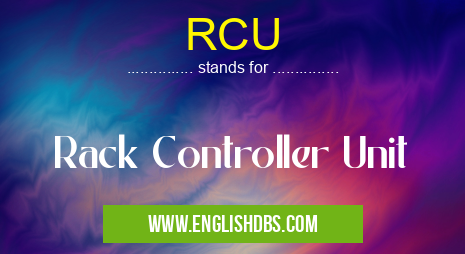What does RCU mean in UNCLASSIFIED
RCU stands for Rack Controller Unit. It is a hardware component used in data centers to manage and control a rack of servers. RCU provides power distribution, thermal monitoring, and environmental control for the servers in the rack.

RCU meaning in Unclassified in Miscellaneous
RCU mostly used in an acronym Unclassified in Category Miscellaneous that means Rack Controller Unit
Shorthand: RCU,
Full Form: Rack Controller Unit
For more information of "Rack Controller Unit", see the section below.
Functions of RCU
- Power Distribution: RCU distributes power to the servers in the rack through a series of power distribution units (PDUs). These PDUs provide power conditioning, surge protection, and remote power control.
- Thermal Monitoring: RCU monitors the temperature of the servers in the rack using temperature sensors. It can adjust the fan speed or activate cooling systems to maintain an optimal temperature range.
- Environmental Control: RCU controls the environment within the rack by monitoring humidity and airflow. It can activate humidifiers or fans to maintain proper humidity levels and ensure adequate airflow for server cooling.
- Remote Management: RCU can be remotely managed through a network interface. This allows administrators to monitor the status of the rack, control power to servers, and adjust environmental settings from a central location.
Benefits of RCU
- Increased Efficiency: RCU optimizes power distribution and thermal management, resulting in increased server efficiency and reduced energy consumption.
- Improved Reliability: By proactively monitoring and controlling the environment, RCU helps prevent server failures and downtime.
- Enhanced Manageability: Remote management capabilities provide administrators with centralized control over rack operations, reducing the need for manual intervention.
- Cost Savings: RCU can help reduce operational costs by optimizing power consumption and preventing costly server failures.
Essential Questions and Answers on Rack Controller Unit in "MISCELLANEOUS»UNFILED"
What is an RCU (Rack Controller Unit)?
An RCU (Rack Controller Unit) is a hardware device used in data centers to manage and monitor multiple server racks. It provides centralized control and visibility over the physical infrastructure, including power distribution, cooling, and environmental conditions.
What are the key functions of an RCU?
Key functions of an RCU include:
- Monitoring power consumption and distribution
- Controlling cooling systems to maintain optimal temperatures
- Detecting environmental issues such as leaks, smoke, and overheating
- Providing remote access and management capabilities
- Generating alerts and notifications for potential problems
What are the benefits of using an RCU?
Benefits of using an RCU include:
- Improved data center efficiency and reliability
- Reduced downtime and increased uptime
- Enhanced security and compliance
- Simplified rack management and monitoring
- Increased visibility and control over physical infrastructure
How is an RCU typically deployed in a data center?
An RCU is typically installed in a data center rack and connected to the power distribution units (PDUs) and environmental sensors. It can be managed locally or remotely through a web-based interface or other management tools.
What are some considerations when choosing an RCU?
When choosing an RCU, consider factors such as:
- Number of racks to be managed
- Power monitoring and control requirements
- Environmental monitoring capabilities
- Remote management features
- Security and compliance requirements
Final Words: RCU is a critical component in data center management, providing power distribution, thermal monitoring, and environmental control for server racks. Its use helps ensure server reliability, efficiency, and manageability, ultimately contributing to the overall performance and availability of IT infrastructure.
RCU also stands for: |
|
| All stands for RCU |
